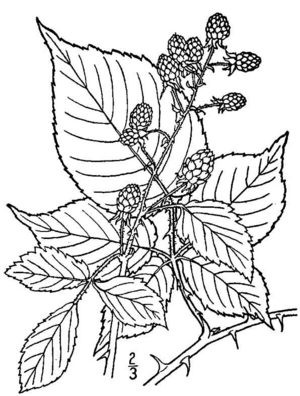Allegheny blackberry facts for kids
Quick facts for kids Allegheny blackberry |
|
|---|---|
 |
|
| Allegheny blackberry 1913 illustration |
|
| Conservation status | |
| Scientific classification | |
| Kingdom: | |
| (unranked): | |
| (unranked): | |
| (unranked): | |
| Order: | |
| Family: | |
| Genus: | |
| Subgenus: | |
| Species: |
R. allegheniensis
|
| Binomial name | |
| Rubus allegheniensis (Porter) Porter 1896
|
|
| Synonyms | |
|
Synonymy
Rubus villosus var. montanus Porter 1890 not Rubus montanus Lib. ex Lej. 1813
Rubus montanus (Porter) Porter 1894 not Lib. ex Lej. 1813 Rubus alleghaniensis Porter Rubus allegheniensis var. nigrobaccus (L.H.Bailey) Farw. Rubus allegheniensis var. plausus L.H.Bailey Rubus allegheniensis var. populifolius Fernald Rubus attractus L.H.Bailey Rubus auroralis L.H.Bailey Rubus avipes L.H.Bailey Rubus bractealis L.H.Bailey Rubus campestris P.J.Müll. Rubus congruus L.H.Bailey Rubus fissidens L.H.Bailey Rubus floricomus Blanch. Rubus latens L.H.Bailey Rubus longissimus L.H.Bailey Rubus nigrobaccatus Focke Rubus nigrobaccus L.H.Bailey Rubus nigrobaccus var. sativus (L.H.Bailey) L.H.Bailey Rubus nuperus L.H.Bailey Rubus par L.H.Bailey Rubus paulus L.H.Bailey Rubus pennus L.H.Bailey Rubus rappii L.H.Bailey Rubus separ L.H.Bailey Rubus villosus Aiton Rubus villosus var. engelmannii Focke Rubus villosus var. montanus Porter Rubus villosus var. sativus L.H.Bailey Rubus villosus var. villigerus Focke Rubus gravesii (Fernald) L.H.Bailey Rubus marilandicus L.H.Bailey Rubus nigrobaccus var. gravesii Fernald Rubus tumularis L.H.Bailey Rubus uber L.H.Bailey Rubus virginianus L.H.Bailey |
|
Rubus allegheniensis is a type of plant often called the Allegheny blackberry or just common blackberry. It's a flowering plant that belongs to the rose family. You can find it very commonly across eastern and central North America. Like other blackberries, it produces tasty berries!
Contents
About the Plant
The Allegheny blackberry can look quite different from one plant to another. It's an upright bramble, which means it's a shrub with thorny stems.
Plant Size and Leaves
These plants usually grow about 1.5 meters (5 feet) tall. Sometimes, they can even reach over 2.4 meters (8 feet) high! A single plant can spread out to be 2.4 meters (8 feet) wide or more. Often, they grow together to form thick patches of many plants.
The leaves grow in an alternate pattern along the stem. They are compound, meaning each leaf is made up of several smaller leaflets. These leaflets are oval-shaped and have jagged, toothed edges.
Flowers and Fruit
The stems, called canes, have many sharp prickles. In late spring, the plant produces white flowers with five petals. Each flower is about 19 millimeters (3/4 inch) wide. By late summer, these flowers turn into shiny, deep-violet to black berries. These are not single fruits, but aggregate fruits, meaning they are made of many tiny fruitlets joined together.
This plant does not like shade. It grows best in places where it can get a lot of sunlight.
Where It Grows
The Allegheny blackberry is very common in eastern and central North America. You can also find it growing in a few places in California and British Columbia, where it has spread naturally.
Forest Influence
This plant plays a big role in the understory (the layer of plants growing below the main tree canopy) of many forests in the eastern United States. When there's a lot of Allegheny blackberry, it helps new tree seedlings grow.
However, if animals like deer eat too much of the blackberry, another plant called hay-scented fern (Dennstaedtia punctilobula) can take over. When hay-scented fern becomes common, it can stop tree seedlings from growing well.
Growing After Disturbances
Allegheny blackberry plants grow much more after events that clear out taller shrubs and trees. For example, after forest fires or strong winds (like a derecho) knock down trees, more sunlight reaches the forest floor. This allows the blackberry plants to grow quickly. Later, as the new tree seedlings grow taller and create more shade, the blackberry plants might become less common.
What It's Used For
The berries of the Allegheny blackberry are safe to eat and are full of good nutrients. People enjoy eating them fresh. They also use them to make many tasty treats, such as pies, cobblers, muffins, jellies, and jams.
How It Fits in Nature
Many animals love to eat the fruit of the Allegheny blackberry. These include elk, foxes, bears, rabbits, raccoons, opossums, squirrels, mice, and chipmunks. Deer also like to nibble on the young stems. Blackberries are an important food source for many types of birds too.
When mammals and birds eat the fruit, they help spread the seeds in their droppings. This allows the plant to grow in new places. A wide variety of native bees, butterflies, beetles, flies, ants, and wasps are drawn to the flowers for their nectar and pollen. Caterpillars, grasshoppers, and other beetles eat the leaves. Birds and small mammals also use the thick patches of blackberry canes for shelter and protection.


